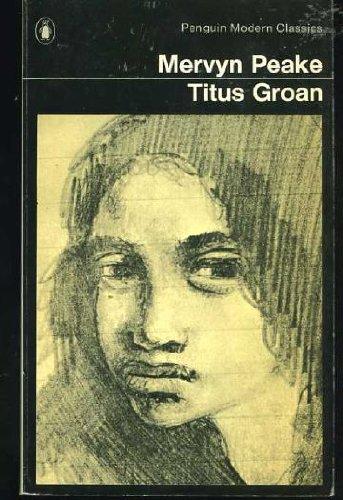Titus Groan by Mervyn Peake (Book Review)

Many of the classics of British literature published in the decade after the Second World War have come to define the epoch and its associated political, economic, and social changes: books like Lawrence Durell’s Alexandria Quartet (1957), Evelyn Waugh’s Brideshead Revisited (1945), Grahame Greene’s The End of the Affair, George Orwell’s Nineteen Eighty-Four (1949), and many others. How can the era of mass politics recognize the individual experience? Is any of the naivety and optimism of the Victorian age to be salvaged after two great and disillusioning wars of annihilation? What remains of the Christian moral ethic? Novelists of the time felt ambitious enough to try to answer these challenging questions, or to at least point in the direction of their respective sympathies. Perhaps this is why Meryvn Peake’s brilliant Gormenghast series, written in complete contrast to the literary zeitgeist, is often overlooked in this period’s literary output. It is unfortunate that readers are not more aware of the sprawling Gothic estates of the Castle Gormenghast in which Peake achieves one of the most impressive sustained literary flights of fancy. Although there is little in the way of magic in the books, due to the characters being so bizarre and the structures taking such grotesquely absurd properties it is considered a fantasy series.[1] In the first book in the trilogy, Titus Groan, we follow the goings-on and machinations within Gormenghast Castle from the birth of the eponymous Titus who will eventually succeed his father: the 76th Earl of Groan, Lord Sepulchrave, until his second birth day.
The Castle Gormenghast is a large and decaying structure that stretches vast distances and is filled with many vacant buildings and halls. The servants who staff their quarters are often ignorant of the current events of the place. In one of the first scenes we are introduced to Rottcodd, whose sole job is to act as curator in the Hall of Bright Carvings and who occasionally dusts the wooden pieces of art under his care. He is visited by Flay, the personal servant of Lord Sepulchrave, who gives him news of the birth of the heir-in-waiting of Gormenghast. Both men struggle to communicate to each other and Rottcodd is disturbed by having his solitude intruded upon. He receives visitors no more than once a year on average.
Drear ritual turned its wheel. The ferment of the heart, within these walls, was mocked by every length of sleeping shadow. The passions, no greater than candle flames, flickered in Time’s yawn, for Gormenghast, huge and adumbrate, out-crumbles all.
Along with the physical decay of Gormenghast, there is a sense that language and human intimacy have concomitantly eroded. Titus’ mother Lady Groan reacts to the physical presence of her new infant with surprise and displeasure. “What have you brought him to me for?” she asks Slag the Nanny of the child?
‘Slagg,’ said the Countess, ‘go away! I would like to see the boy when he is six. Find him a wet nurse from the Outer Dwellings. Make him green dresses from the velvet curtains. Take this gold ring of mine. Fix a chain to it. Let him wear it around his wry little neck. Call him Titus. Go away and leave the door six inches open.’
The inhabitants seem to be propelled by a languid inertia allowing them to do no more than fulfill their time-honoured and birth-given rôles. Even the strongest of human impulses, including that of motherhood, has atrophied in the Castle. No character is more existentially fatigued than Lord Sepulchrave. While not as cold as his wife, he is certainly more disinterested in his own existence.
How could he love this place? He was a part of it. He could not imagine a world outside it; and the idea of loving Gormenghast would have shocked him. To have asked him of his feelings for his hereditary home would be like asking a man what his feelings were towards his own hand or his own throat… But it seemed that Lord Sepulchrave found his only interest in these days among the volumes in his library and in a knob of jade on his silver rod, which he would scrutinize for hours on end.
The Princess of the Castle, Lady Fuschia, is a case of arrested development. Her main maternal influence is that of Nanny Slag, who lacks communicative powers beyond fussing over her charges and wailing in self pity. Upon receipt of the news of her younger brother’s birth, Fuschia is unimpressed.
‘No!’ shouted Fuschia, the blood rushing to her cheek. ‘No! no! I won’t have it. Oh no, no, no! I won’t! I won’t! It mustn’t be, it mustn’t be!’ And Fuschia flinging herself to the floor burst into a passion of tears.
While not of royal blood, Doctor Prunesquallor and his sister Irma are often to be found at events of importance. Despite a goofy and foppish disposition with a tendency to prolixity, the Doctor is able too see through the absurdities of the place and is able to provide comic relief through a stream of heavy verbiage.
The doctor with his hyena laugh and his bizarre and elegant body, his celluloid face. His main defects? The insufferable pitch of his voice; his maddening laugh and his affected gestures. His cardinal virtue? An undamaged brain.
There is a simmering tension between Flay and the head chef Swelter, a sadistic and grotesque resident of Gormenghast who one feels would be comfortable as an assistant to Sweeney Todd. He is to be found often whispering and licking his well-sharpened knives and cleavers reminiscent of Gollum speaking to his precious ring.
Abiatha Swelter, who wades in a slug-like illness of fat through the humid ground mists of the Great Kitchen. From bowls as big as baths, there rises and drifts like a miasmic tide the all but palpable odor of the day’s bellytimber. The arrogance of this fat head exudes itself like an evil sweat.
The only persona in the book whose brain does not seem to have become warped from being situated within the mouldering fortress is Steerpike, a sharp-witted and relentlessly ambitious youth who escapes from his position as a grunt in Swelter’s kitchen. Outside of the quizzical eye of Prunesquallor, no other character is able to intuit his Machiavellian intentions or halt his rise. By the end of the novel Steerpike has firmly ensconced himself in the court and has attained a significant position of power and influence.
His body gave the appearance of being malformed, but it would be difficult to say exactly what gave it this gibbous quality. Limb by limb it appeared that he was sound enough, but the sum of these several members accrued to an unexpectedly twisted total. His face was pale like clay and save for his eyes, masklike. These eyes were set very close together, and were small, dark red, and of startling concentration… Steerpike had an unusual gift. It was to understand a subject without appreciating it. He was almost entirely cerebral in his approach. But this could not easily be perceived; so shrewdly, so surely he seemed to enter into the heart of whatever he wished, in his words or his deeds, to mimic.
Shepherding the endless rites required by the royalty of Gormenghast is Sourdust, the Master of Ritual. Throughout the novel we are given amusing vignettes of the inane procedures required to maintain the traditions of Groan dynasty.
Lord Sepulchrave was returning to his room after performing the bi-annual ritual of opening the iron cupboard in the armoury, and, with the traditional dagger which Sourdust ad brought for the occasion, of scratching on the metal back of the cupboard another half moon, which, added to the long line of similar half moons, made the seven-hundred and thirty-seventh to be scored into the iron. According to the temperaments of the deceased Earls of Gormenghast the half moons were executed with precision or with carelessness. It was not certain what significance the ceremony held, for unfortunately the records were lost, but the formality was no less sacred for being unintelligible.
The Earl, tired from a day of ritual (during part of which it was required of him to ascend and descend the Tower of Flints three times by the stone staircase, leaving on each occasion a glass of wine on a box of wormwood placed there for the purpose on a blue turret) …
Tiresome in the extreme for all those present, it would be hardly less tedious for the reader to be obliged to suffer the long catalogue of the Breakfast ritual…
While the novel’s main story arc is being driven by Steerpike’s schemes to assume power, most of the text is dedicated to sketching the stultifying and orthodox atmosphere of Gormenghast. In it, Peake paints us a rich gothic tapestry, so detailed the reader finds no trouble maintaining a form of suspended disbelief. There are no considerations of social justice or economics or organization in this world. At one point Steerpike notes that it seems unfair that many residents in the Outer Dwellings are starving whilst the Groans waste food in pointless rituals. However so strong is the reactionary intellectual hegemony in this world, that the import of his words fails to even register within the minds of the Castles inhabitants. Like a poem by A. C. Swinburne, the Gormenghast series seems to be interested in art for art’s sake, pushing a haunting and surreal literary aestheticism to its zenith. Discovering this world is like finding a old book volume that has been hiding behind a large hardcover on the shelf; its partial obscurity heightening its romanticism. While not a light read, Titus Groan is nevertheless a good one.
References
-
It would be more appropriate to put the series in the fantasy of manners genre. ↩
